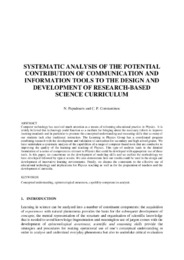Systematic analysis of the potential contribution of communication and information tools to the design and development of research-based science curriculum

View/Open
Date
2001Author
Papadouris, N.
Constantinou, Constantinos P.
Metadata
Show full item recordAbstract
Computer technology has received much attention as a means of reforming educational practice in Physics. It is
widely believed that technology could function as a medium for bringing about the necessary reform to improve
learning standards and in particular to promote the conceptual understanding and reasoning skills that so many of
our students lack after traditional instruction. The Learning in Physics Group has a coordinated program
combining research with the development and validation of curriculum for secondary and high school grades. We
have undertaken a systematic analysis of the capabilities of a range of computer-based tools that are conducive to
improving the quality of the learning and teaching of Physics. This type of analysis leads to the detailed
formulation of a series of competencies relevant to Physics that could be developed with appropriate use of these
tools. In this paper, we concentrate on the development of modeling skills and we outline the methodology we
have developed followed by typical results. We also demonstrate how our results could be used in the design and
development of innovative learning environments. Finally, we discuss the constraints to the effective use of
educational technology and implications for Physics teaching as well as for the preparation of teachers and the
development of curricula.